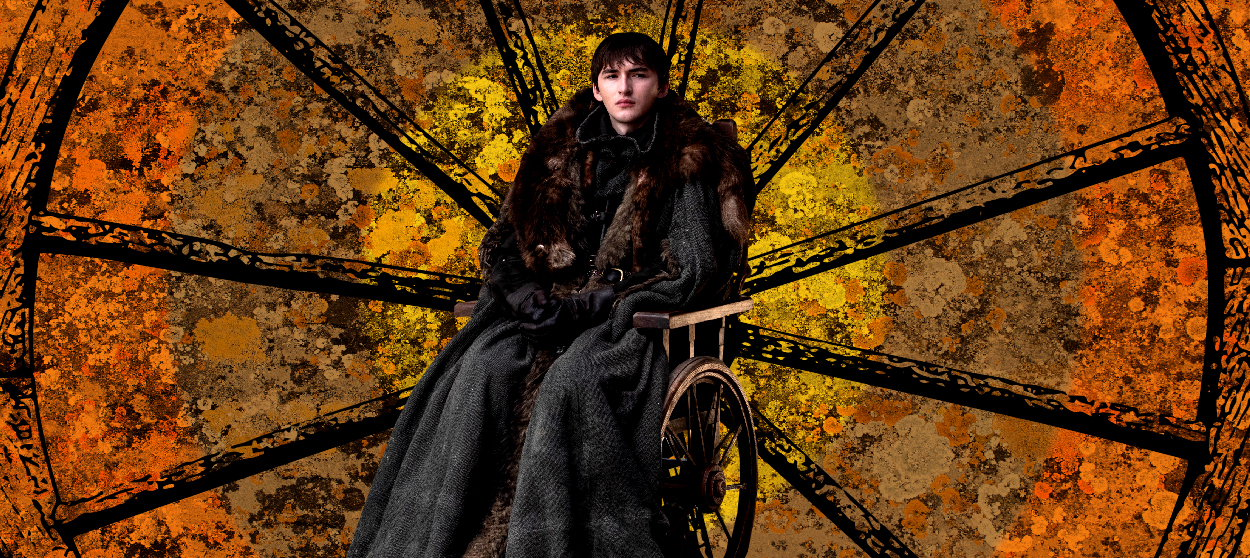The Game of Thrones ending was darker than you think
So much for breaking the wheel


Eight seasons after King Robert Baratheon's death opened a power vacuum in Westeros, we at last have our "winner" in the eponymous Game of Thrones. The series' controversial and rocky final season concluded on Sunday night with the surprise crowning of Bran the Broken and the determination that oligarchy — not democracy — is the system to best honor Daenerys' dream of "breaking the wheel."
Admittedly, the show is called Game of Thrones, not Game of the Ballot Boxes. But still I wonder: What was the point in all those clues that pointed toward the culmination in a new political system, only for Westeros' ruling class to be restored yet again?
Prior to the "most powerful people" in Westeros picking their new (and hitherto useless) leader in the series finale, Samwell Tarly is mocked, one last time, for his whimsical ideas. "We represent all the great houses, but whomever we choose, they won't just rule over lords and ladies," he pipes in. "Maybe the decision about what's best for everyone should be left to, well, everyone." His comment is followed by a profound pause that serves as the showrunner's wind-up to their cynical punch line: Psyche! Did you actually think for a moment that Westeros was going to become a democracy? The lords laugh the idea off, and even Sansa gives the proposition a smirk. "Maybe we should give the dogs a vote as well!" chimes in Edmure Tully.
The Week
Escape your echo chamber. Get the facts behind the news, plus analysis from multiple perspectives.

Sign up for The Week's Free Newsletters
From our morning news briefing to a weekly Good News Newsletter, get the best of The Week delivered directly to your inbox.
From our morning news briefing to a weekly Good News Newsletter, get the best of The Week delivered directly to your inbox.
I have to ask, though: What's so funny about this idea? Because up until Sam's suggestion is shot down, Game of Thrones had been laying a trail toward the eventual liberation of the commoners from the continent's oppressive feudal system. The most obvious hint of this came in season five, when Daenerys defines her goal for Westeros: "Lannister, Targaryen, Baratheon, Stark, Tyrell, they're all just spokes on a wheel," she tells Tyrion. "This one's on top, then that one's on top, and on and on it spins, crushing those on the ground ... I'm not going to stop the wheel, I'm going to break it." Yet the system that replaces it — in which kings and queens "will be chosen … by the lords and ladies of Westeros" — ends only hereditary monarchy. Despite Tyrion claiming the new system breaks the wheel as Daenerys' imagined, it doesn't in any way stop the great houses from continuing to crush the lowborn people beneath them.
Some correctly predicted against the "democracy end game" theory on Reddit by noting that commoners choosing their own leaders would still be too radical and foreign to be embraced in Westeros. Only, that isn't strictly true: Game of Thrones is replete with examples of functioning democratic systems. At the Night's Watch, we see representative democracy in the form of the "Choosing," when a new Lord Commander is picked via direct vote. Likewise, Jon Snow spends significant time among the wildlings, where the Free Folk decide individually who to follow. Other quasi-democratic systems are also in play in the Seven Kingdoms and beyond, such as the Iron Island's "Kingsmoot," when ship captains elect their new leader, as well as in the Free Cities of Essos, where republics are ruled by chosen leaders selected from the mercantile elite. Even Lord Varys' famous riddle, which observes that "power resides where men believe it resides," hints that democratic revolution is possible in Westeros.
The best indicating factor that Game of Thrones' many winks at democracy were nothing more than red herrings, though, was that its major characters were primarily of nobility. There are few opportunities, then, to learn what life is like for the commoners, or what their opinions are about the ruling class. Most often they are depicted as the lords and ladies saw them: mindless, dirty hoards. The commoners' biggest collective moment of agency comes in their support of a theocrat, the High Sparrow. It is he who delivers an ominous warning about the lowborns' power to the High Garden matriarch, Olenna Tyrell: "You are the few, we are the many. And when the many stop fearing the few …"

Yet for all of Game of Thrones' otherwise endless hand-wringing about what makes a good leader, nothing comes of any such allusions. "Whenever I watch [Game of Thrones], I'm struck by how they are all arguing over which kind of despotism is better — the one where the dictator is cruel, or the one where the dictator hates slavery?" Emily Dreyfuss observed at Wired during one pre-season discussion. "Like, uh, y'all: that's the same political system, just led by different people." What's so irritating, then, is that Game of Thrones never pursued any alternative. Instead, Thrones concluded on Sunday with not one but two new monarchs (as Sansa is now leading the independent North), complete with a weirdly uplifting montage in which Arya sets off on a Christopher Columbus-like quest to discover the New World.
A free daily email with the biggest news stories of the day – and the best features from TheWeek.com
The true conclusion of the show is dark: We are back, more or less, to where we began. Daenerys' hubris got the best of her and the only chance for the liberation of the commoners of Westeros was quashed by her self-assuredness. Distressingly, the remaining Westerosi leaders do not adopt a significantly more progressive form of governance. It is no mistake, I think, that the show's final shot is of Jon returning to the lands of the Free Folk amid a crowd of self-determining wildlings. It is as if to remind us, in this last moment, that there could always have been another way.
It is to Game of Thrones' ultimate detriment that this is not more openly addressed. While the showrunners might have tried to add an element of subtle nuance to the ending with Jon's departure from the Kingdoms, dozens of other threads teasing at a different outcome continue to hang loose and unfulfilled. The problem isn't that Game of Thrones didn't have an uplifting ending, but that all its revolutionary foreshadowing turned out to be another empty — and now never-to-be-fulfilled — promise.
Jeva Lange was the executive editor at TheWeek.com. She formerly served as The Week's deputy editor and culture critic. She is also a contributor to Screen Slate, and her writing has appeared in The New York Daily News, The Awl, Vice, and Gothamist, among other publications. Jeva lives in New York City. Follow her on Twitter.
-
 Will AI kill the smartphone?
Will AI kill the smartphone?In The Spotlight OpenAI and Meta want to unseat the ‘Lennon and McCartney’ of the gadget era
-
 Must-see bookshops around the UK
Must-see bookshops around the UKThe Week Recommends Lose yourself in beautiful surroundings, whiling away the hours looking for a good book
-
 A Nipah virus outbreak in India has brought back Covid-era surveillance
A Nipah virus outbreak in India has brought back Covid-era surveillanceUnder the radar The disease can spread through animals and humans
-
 Walter Isaacson's 'Elon Musk' can 'scarcely contain its subject'
Walter Isaacson's 'Elon Musk' can 'scarcely contain its subject'The latest biography on the elusive tech mogul is causing a stir among critics
-
 Welcome to the new TheWeek.com!
Welcome to the new TheWeek.com!The Explainer Please allow us to reintroduce ourselves
-
 The Oscars finale was a heartless disaster
The Oscars finale was a heartless disasterThe Explainer A calculated attempt at emotional manipulation goes very wrong
-
 Most awkward awards show ever?
Most awkward awards show ever?The Explainer The best, worst, and most shocking moments from a chaotic Golden Globes
-
 The possible silver lining to the Warner Bros. deal
The possible silver lining to the Warner Bros. dealThe Explainer Could what's terrible for theaters be good for creators?
-
 Jeffrey Wright is the new 'narrator voice'
Jeffrey Wright is the new 'narrator voice'The Explainer Move over, Sam Elliott and Morgan Freeman
-
 This week's literary events are the biggest award shows of 2020
This week's literary events are the biggest award shows of 2020feature So long, Oscar. Hello, Booker.
-
 What She Dies Tomorrow can teach us about our unshakable obsession with mortality
What She Dies Tomorrow can teach us about our unshakable obsession with mortalityThe Explainer This film isn't about the pandemic. But it can help viewers confront their fears about death.
